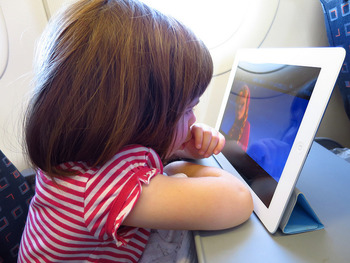The Loop Center for Social and Emotional Development
 The lack of sunlight and freezing cold temps aren't just throwing you into a moody state. Your children are feeling the effects of the grey winter days too. The shorter days have messed with our Circadian Rhythms, the body's natural behavioral responses to light and dark. Researchers have found a fairly strong genetic link related to the way our 24-hour body clock responds to the shorter days, which means this: if you find yourself feeling grumpy in the winter, chances are, so do your kids. Nature's Cruel Dichotomy Here's the tricky part: while you are dealing with your winter blues by constantly fighting off the desire to stay in your PJs and cuddle up on the couch with a book and a nap, your kids are likely dealing with it by going totally bonkers with pent up energy. Isn't nature cruel? Wouldn't you give anything to borrow some of that crazy-eyed adrenaline? It turns out most children respond to disruptions in natural sleep patterns (i.e., having to wake up when it's still dark; staying awake at night after the sun has set) with a stress reaction which can includes increases in the body's natural steroid hormone cortisol. This means while you are settling in for a long winter's nap, your child is entering into "fight or flight" mode. Not a wonderful combination. What to do? Luckily, there are some easy ways to handle BOTH of these competing reactions to cabin fever. I'll break them to you slowly. 1. Get outside. YES, I know this is the LAST thing mama (or papa) bear wants to do during the chilly winter months when it's so easy to just. lay. down. But exposure to sunlight, even if it's through cloud cover, is one of the best ways to get Vitamin D, a natural stimulant and anti-depressant. A short morning walk with the kids, or sitting on the porch while the dog does his business is enough to help you have more energy all day long AND help your children regulate their levels of cortisol and feel (and act) calmer during the day. 2. Get exercise. I know I'm not the first person to tell you this: by exercising, you can increase your body's natural abilities to remain alert and focused (and therefore less depressed or groggy). Plus, exercise begets exercise. If you get out for that morning walk one day, you're more likely to get out the next day. Exercising with your CHILDREN will help them work out increased levels of cortisol and regulate internal stress levels. Play tug of war before the bus in the morning. Do 10 jumping jacks in between bites of toast. Play tag all the way to the car. Have a tickle fight. It's a win-win. 3. Get close. This one might not be that obvious. Physical touch increases levels of dopamine (think happiness-drug) and helps reinforce our sense of purpose. Instead of waking your children (or your spouse) with the light switch, try giving them a quick snuggle. Lie in bed with them while you talk about what the day will bring. This sense of closeness can help regulate emotion, soothe anxiety, and start the day with a feeling of belonging. This also works especially well when used spontaneously throughout the day. Here's the catch: to generate the big boost of regulatory hormones, the physical closeness has to be with someone with whom you've already established a bond. So, if you hug your boss or a random person in the elevator, you won't get quite the same benefit. But you might get some funny looks. 4. Get rid of the junk food. Researchers have linked spikes in sugar to a lack of concentration and mood swings in adults. This link is much stronger in children. If you are managing the winter doldrums with Dum Dums and Krispy Kremes, you will end up with a few minutes of satisfaction and many months of problems, including headaches, disrupted sleep, attention problems, behavior issues, lack of energy, increased risk for diabetes, etc. And that's just you. The effects are worse with children! Circadian Rhythm disruption can exacerbate the effects of sugar on our regulatory systems, creating a nasty cycle of sugar spikes, low blood sugar, and poor sleep quality. Try to indulge the need for comfort food with healthy alternatives like apples & cheese, carrots & Ranch dressing, or bananas & peanut butter. Your mind, your mood, and your children's teachers will thank you. Above all else, remember this: Winter is relatively short. Take a moment each day to reflect on the GOOD things that happen in the winter. Hockey, ice skating, snowman building, extra blankets, more time with your children, etc. And if all else fails, crank up the heat, put your kids in their bathing suits, make lemonade and have a fake trip to the beach at home. There is truth in the phrase, "fake it 'til you make it"...
1 Comment
As parents, we’ve all heard that too much tv time for young children is bad. In fact, research shows that too much time spent watching tv (and therefore away from real-time 3-D interactions and play) can negatively impact learning, attention, sleep and physical health. But what does “too much” time mean? And how does this research apply to interactive applications or educational games on tablets and electronic notebooks?
ZERO TO THREE (ZTT), a national non-profit organized to bring awareness to developmental issues of young children just published new guidelines for screen time based on recent research about screen media use with young children. You can find the full report here. Notably, the research highlights some distinct benefits to incorporating screen time in limited amounts into your child’s daily routine. This is good news for parents living in the digital age-you’re not permanently scarring your child by letting them play Bugs and Buttons while you grab your first shower in a week! But does this mean that you can guiltlessly let your child play “ABC Mouse” uninhibited all day while you peruse the Internet for a killer price on that fabulous black dress you’ve been pining over for months? Not exactly. Let’s break down ZTT’s recommendations. 1. Put Limits on Screen Time. Most of the developmental damage that results from too much screen time doesn’t necessarily come from actually viewing the screen. Instead, time spent in front of the screen means time NOT spent engaging in positive, warm, loving interactions with parents and caregivers where children learn turn-taking, emotion regulation, and exploratory skills; which is the single most important factor in a child’s healthy development. Bottom Line: If you can give these moments of positive interaction to your child in excess, a few minutes of screen time here or there isn’t a big deal. 2. Participate in screen time. Remember all those things we just said about positive interaction? You can use the screen to do it! It turns out, when parents actively participate in screen time, making it a language-rich, connection-filled experience, children can expand their learning and enhance their understanding of the world around them. When your child is playing “The Wheels on the Bus” for the 900th time, try saying, “Hey, we rode on a bus this morning!, just like this bus!” (Bonus points for singing out loud with your child in a public place.) Bottom Line: Spend the majority of your child’s screen time playing along with her. Make comments about counting objects in the real world while Dora counts alligators. And don’t beat yourself up if you give your child your phone while you catch the quick adult conversation you’ve been dying to have with a friend. 3. Turn off the TV when no one’s watching it. Researchers have long since known that background TV noise is detrimental to a child’s development of attention, higher-order thinking, and decision making. Actually, parents should wait to watch adult-themed content until after the kids are asleep. Fear-inducing images and fast-paced screen shots have been shown to temporarily impair young children’s ability to plan and organize their play, an essential precursor to sustained attention and social skill development. Bottom Line: 24-hour news is not healthy for children to watch (pictures of child soldiers in the middle east?!?) and Sports Center plays 12 times a day: catch it later. 4. Turn off all screens an hour before bedtime. Screen use has been linked to sleep difficulties and disorders, especially when digital devices are viewed just before sleep. Moving images on a screen are stimulating, and a child may have a hard time relaxing their body in order to prepare for sleep. As much as possible, remove screen use from your child’s bedtime routine. This goes for you too. Keep your phone in the kitchen during your child’s bedtime routine. I promise, that email can wait. Bottom line: Read real books at bedtime instead of e-Books and take the tv out of your child’s bedroom. You will thank me when you wake up 12 peaceful, non-interrupted hours later. Using ZTTs review of the research and other psychology and education research, my recommended screen time hours: Children < 2: No more than 30 minutes/day. Try to limit screen time as much as possible and interact with your child while they are using the screen. This is prime brain development time and live, in-person, human interaction is the only way to do it right. Children < 5: No more than 1 hour/day. Encourage self-play time instead. Help them get started building a garage for their toy trucks, then tell them how excited you are to see what it looks like after you finish making dinner. Children > 5: Limit to 2 hours/day max. (I would say 1 if possible). Children at this stage of life are actively practicing their social and academic skills. Encourage them to write a letter to someone they know or someone they’d like to know, even a TV character. Check out Curious George books from the library so they can read about their favorite characters instead of watching them on TV. As with everything in life, extremes are not necessarily good. If you implement a strict screen ban with your children, you might have a hard time explaining why you are allowed to check your emails during their basketball practice. They also might be behind their peers in understanding basic technological principles by the time they get into the elementary school classroom. Too much screen time has clear negative effects on brain, academic, social, and emotional development. Use your judgment as a parent to interpret these guidelines in ways that can benefit your family the best. Mentoring Matters Series: Positive Relationships & Brain Development
September 11th, 5:30-7pm The first of VMP's Mentoring Matters series, this event will feature University of Richmond professor and psychologist, Dr. Kristen Jamison, who will speak on the impact of positive relationships on brain development. Recent research presents conflicting data on the impact of one specific mentor on a mentee, however the intersection of brain science and educational psychology allows us to look past this specific relationship at the long-term neurological effects of forming positive relationships. Dr. Jamison's presentation will introduce a provocative hypothesis on how to change the question of mentoring effectiveness and focus on the science of the interaction as a long-term source of attachment building. This event provides an opportunity for mentors, program staff, members of the community who care about positive youth development to connect with each other and learn. To register, go to http://www.vamentoring.org/events Science Museum of Virginia 2500 West Broad Street Third Floor, Richmond, Virginia 23220 |
AuthorKristen R. Jamison, M.T., Ph.D. Archives
January 2015
Categories |

 RSS Feed
RSS Feed